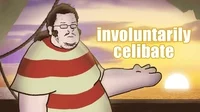

Hello! Welcome back. Today we’ll focus on a very modern problem within our society. If you have never heard of the word “incel” before, this might be your chance to get to know it. This quiz is also useful if you’re looking for:
Do you already know which vocaloid you are?

The term ‘incel’ has recently become a popular topic in the media and the online world. It stands for ‘involuntary celibate’ and is used to describe someone unable to find a romantic or sexual partner despite wanting one. But where does the term ‘incel’ actually come from? The term ‘incel’ was first coined in the early 1990s. It was used in a Canadian online discussion forum called ‘Alana’s Involuntary Celibacy Project’.
The forum was created by a Canadian woman named Alana, who wanted to provide a safe space for people who were struggling with a lack of romantic or sexual relationships. Alana’s forum was a place where people could talk openly about their struggles and share advice. In the early days, it was mainly used by women, but over time it became a much more diverse community. The term ‘incel’ was quickly adopted by other online communities, and its meaning began to evolve. It is now used to describe anyone who is involuntarily celibate, regardless of gender or sexuality.
Are you aromantic?
In recent years, the term has become associated with a toxic online culture that promotes misogyny and violence. This is a far cry from the original meaning of the word, which was simply a term used to describe people who were unable to form romantic or sexual relationships. Incels have become a controversial topic in recent years, and the term has been widely used in the media. Despite its negative connotations, it is important to remember that the term was originally coined to provide a safe space for people who were struggling with a lack of romantic or sexual relationships.
Incels are a group of people who identify as “involuntarily celibate” and generally share similar characteristics. Characteristics of Incels include a strong sense of entitlement and a feeling of being “owed” sex or romantic relationships by society. Incels are known to be misogynistic, feeling that women have “wronged” them by not reciprocating their romantic advances, and they may also express resentment and hostility towards couples, especially heterosexual couples.
Incels may also believe that they are entitled to sex and romantic relationships, with many believing that they are being discriminated against due to their physical appearance or lack of social skills. Incels often possess a strong sense of victimhood, believing that society does not give them the respect and attention that they deserve. This feeling of being wrong is often expressed through an extreme sense of entitlement and, in some cases, through violent fantasies.
Incels have become increasingly visible in recent years due to their presence on the internet and the extreme views they express. It is important to note, however, that not all Incels are violent or dangerous, and many are simply extremely expressing their feelings.
Incels may also feel that they have been “cheated” out of a successful romantic life and often express bitterness and resentment towards those who have achieved success in this area. Incels also tend to possess a rigid view of gender roles. They may view women as objects to be conquered or conquered by, rather than as equals. Many incels also have a strong belief in traditional gender roles and may express contempt for women who choose to pursue careers or who reject traditional gender roles.
Incels are known to be an online community, with many members communicating and participating in online forums and chat rooms. Incels often express their views in extreme and often violent language, and they may engage in online harassment and threats.
Incels also tend to be highly insular, often isolating themselves from friends and family and choosing to interact mostly with other incels online. Incels also possess a strong sense of alienation, feeling that they are misunderstood and rejected by society. They often express feelings of loneliness, despair, and anger. Incels may also feel that they are not able to form meaningful relationships, which can lead to feelings of isolation and depression.
The first step in determining if you are an incel is to assess your dating life. Have you had any recent dates? If not, how long has it been since your last date? Do you feel like you are unable to approach potential partners or make meaningful connections with them? If you can answer yes to any of these questions, you may be an incel.
Another factor to consider is your social circle. Do you have any close friends or confidantes with who you can talk about your dating struggles? Do you feel like you are unable to make connections with potential partners due to a lack of social confidence? Do you feel like your friends are holding you back from making meaningful connections? If you can answer yes to any of these questions, you may be an incel.
Do you have Daddy Issues?
Finally, assess your level of self-esteem. Do you feel like you are not attractive or desirable enough to be in a relationship? Do you feel like you are not worthy of finding love? Do you feel like you are not good enough for anyone to be interested in you? If you can answer yes to any of these questions, you may be an incel. If you have identified with any of the above, you may be an incel. If this is the case, there are steps you can take to address your incel status. Consider talking to a therapist or counselor about your struggles, and joining a support group to share your experiences and learn from others.
Additionally, try to build meaningful connections with people in your social circle, and take steps to improve your self-esteem. With effort and dedication, you can overcome your incel status and find the meaningful connection you desire.
Here’s a scientific approach to this phenomenon.